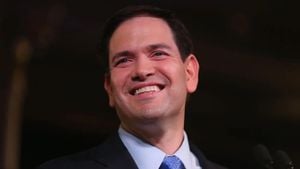Britain faces pressure to pivot away from the European Union toward the United States for trade opportunities, as advised by Stephen Moore, a senior economic adviser to former President Donald Trump. Moore's remarks come at a time when UK Prime Minister Sir Keir Starmer aims to mend relations with the EU, but the stakes are high, according to Trump’s team.
Moore's statement is clear: the UK must figure out if it wants to embrace the "socialist model" of the EU or the free-market principles of the US. "I’ve always said Britain has to decide — do you want to go toward the European socialist model or do you want to go toward the U.S. free market?" he underscored, highlighting the perceived dichotomy between the two economic models.
Even more pointed, he warned, "If you shift more toward the European model, we’d be less interested in having a free trade deal." This declaration puts Starmer’s aspirations to cozy up to Europe, seen as pivotal for economic recovery, under the microscope.
The former president has committed to imposing tariffs on imports from various countries, with figures reaching up to 20 percent for goods entering the US. Notably, imports from China already face tariffs of up to 60 percent. Moore maintains this aggressive approach is meant to invigorate the American economy and stimulate job creation.
Adding to the scenario is the looming possibility of Trump's influence shaping the UK’s trade strategies following his reinstatement. The consequences of not aligning with US trade preferences could spell trouble, potentially leading to tariff impositions and threatening economic stability for the UK.
Starmer’s administration has expressed intentions to reset diplomatic ties with the EU, emphasizing the importance of being aligned with Europe, which stands as Britain's primary trading partner. This intended realignment, aimed at fostering economic growth, contradicts the warnings from Moore, making the situation delicate.
The Chancellor Rachel Reeves is at the forefront of this battle to negotiate trade relations. She recently stood firm against compromising on agricultural regulations, stating, “We are not going to allow British farmers to be undercut by different rules and regulations from other countries.” This stance foreshadows significant hurdles for any possible trade deal with the US, especially considering prior controversies over American agricultural products, such as chlorinated chicken and hormone-treated beef, which have raised concerns for many British consumers.
Bank of England chief Andrew Bailey also commented on the gravity of the UK’s changing trading relationship with the EU. He called for the UK to rebuild trade relations with Europe, popping the balloon on any easy escape from the EU's economic sphere.
Despite Moore's efforts aiming to push the UK toward the US, there are echoes within political circles doubting the viability of aligning completely with either model. Molly Scott Cato, economist and former MEP, labeled Moore's threats as tactics of "bullying," arguing for the necessity of seeking beneficial arrangements with both the US and the EU. She called upon Starmer's government to pursue any avenues to mitigate trade barriers imposed by Brexit, such as exploring Veterinary Agreements to lower trade friction.
This transition is pivotal, shaping perceptions and realities of trade dealings moving forward. Past administrations, including those under Boris Johnson, sought to secure favorable trade deals but stumbled due to the controversy surrounding U.S. agricultural standards. The question remains whether the current UK government can navigate the tumultuous waters of international trade without sacrificing its own standards and practices.
The backdrop of this trade discourse paints the UK as straddling two contrasting global economic positions. While Trump’s team makes it clear what they’d expect, UK is trying to balance the scales and engage with neighboring states, pushing back against the extra-territorial pressures of American trade reforms.
Moore concluded by reitering, “I think we do have a special relationship with the Brits more than we do with the Germans and the French and the rest of Europe." This statement not only emphasizes historical ties but also hints at the underlying competitive dynamics within international trade.
Moving forward, it seems inevitable the UK must make hard decisions about its economic alliances, weighing the risks involved with tightening relations with either the US or the EU. The path chosen will likely ring through the country’s economy for years to come, as uncertainties loom over how these relationships will be shaped and redefined under the watchful eyes of both American and European leaders.
All things considered, these are complex times for British trade policy, wrapped within broader geopolitical ambitions. With contrasting ideologies being pushed by Trump and endorsements for EU collaboration from various sectors, the future of Britain's trade engagements remains at the forefront of political dialogue, challenging Starmer’s government to find the right balance without losing sight of key economic interests.
The dialogue around trade continues to intensify, shaping not just political interactions but also economic trajectories for years to come. How the UK maneuvers these complex negotiations and perceptions will be pivotal as they navigate the reality of post-Brexit trade agreements amid pressures from Washington and Brussels alike.



